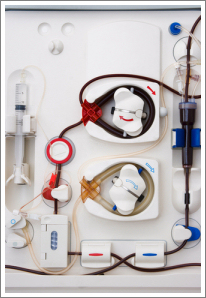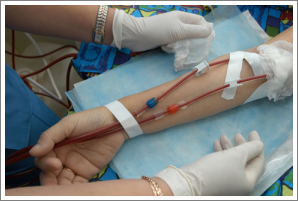11403 Regency Green Dr.
Cypress TX 77429
713-690-2200
email@homedialysis.biz
Your kidneys keep you healthy
Your kidneys:
■ Clean the blood of wastes
■ Remove extra fluid (water)
■ Keep your body chemicals in balance:
sodium, potassium, calcium and
phosphorous
■ Help control blood pressure
■ Help make red blood cells
■ Produce Vitamin D, which helps
maintain the health of your bones
Kidney Failure
In some patients the kidneys become
damaged and are unable to perform their
normal functions. You  can have a lot of
kidney damage and not even feel ill. That’s
why kidney disease is often called a silent
disease. It is only when kidney damage is
severe that you may feel sick.
can have a lot of
kidney damage and not even feel ill. That’s
why kidney disease is often called a silent
disease. It is only when kidney damage is
severe that you may feel sick.
In most patients kidney diseases affect both kidneys. When your kidney function is below 15%, you may begin to have symptoms such as feeling tired or weak, or losing your appetite. You will then need some form of treatment to replace some of the functions of a healthy kidney.
Treatment Options
The two treatments used when kidneys fail
are dialysis and transplantation.
Dialysis is a treatment performed to remove
extra fluid and waste from your body.
Kidney transplantation means getting a new
kidney to replace your damaged kidneys.
Both dialysis and transplantation are effective
treatments for kidney failure.
If you do nothing, your health will continue to
get worse. If left untreated, kidney failure can
lead to death.
What is Hemodialysis? (HD)
 During at home hemodialysis, blood is sent from the body to an outside machine (dialyzer) that filters out the waste and extra fluids then returns the blood to the body
During at home hemodialysis, blood is sent from the body to an outside machine (dialyzer) that filters out the waste and extra fluids then returns the blood to the body
Hemodialysis, or HD, cleans the blood by using
a special filter called a dialyzer (dye’-uh-lizer).
Inside the dialyzer are thousands of hollow fibers
as thin as hairs—punctured with millions of
tiny holes.
During HD, blood moves through the inside
of the dialyzer fibers. Blood cells and proteins
that are needed by the body are too big to pass
through the holes. They go back to the body.
Wastes and extra water go through the holes
and into dialysate fluid that is thrown away.
Benefits to Home Dialysis
The ability to dialyze at home can offer considerable lifestyle benefits. For many patients, at home dialysis can provide a level of flexibility not possible at a dialysis center. Whether it's additional time spent working, with family or fulfilling other obligations or interests, at home dialysis allows patients to arrange their treatments around their own schedule. At home dialysis also saves time because there is no need to drive back and forth to a dialysis center three days per week.
Additionally, research has shown that patients who perform some types of at home dialysis may experience better quality of life and better clinical results - especially those who take advantage of their home setting to have more frequent or extended dialysis.
As with any form of dialysis, a patient's nephrologist directs a patient's specific care and treatment. Home dialysis allows doctors to customize the frequency and length of treatment to best meet individual needs.
Kidney disease is serious—but you can live a productive life with it. The good news is that kidney disease can be treated. Today, there are even ways to slow down the rate of damage to your kidneys as well.

Keeping a healthy attitude
With the help of a renal dietician, your doctor
and medical team, you can improve the way
you feel by eating right, getting proper
exercise and taking your medications as
prescribed. Your attitude can improve the way
you feel, too. Keeping a positive outlook on
life can really affect your health.
Frequently Asked Questions
What can I expect with HOME Dialysis Staff Assisted Home Dialysis?
While having your treatment, you sit
or lie next to a hemodialysis machine in your home. One of our Trained and Certified Staff personnel will ensure your dialysis is working correctly and ensure you are comfortable.
At the beginning of treatment, our Staff professional will put two needles into a vein in your forearm called an access. One needle is connected to tubing, which takes your blood out of your body to be cleaned.
The blood, after being filtered
by the dialyzer, goes back into your
body through tubing attached to the
other needle. There is about one cup
of blood outside your body at any
time. All your blood is filtered through
the dialyzer several times. At the end
of treatment, your blood is returned to
your body.
Putting the needles into your arm can
cause a little discomfort.
Dialysis does not hurt, although some people do feel nauseated or dizzy during parts of the treatment. Mostly, hemodialysis is a quiet time. During treatments, most people keep busy doing things like watching TV, reading or talking.
How long and frequent are treatments?
Most people need hemodialysis three
times a week. Each treatment lasts
about four hours.
What are the benefits of Staff Assisted Home Dialysis?
Research has shown that patients who perform dialysis at home may experience better quality of life and better clinical results - especially those who take advantage of their home setting to have more frequent or extended dialysis. Many patients choose to perform their treatments at night while they sleep, getting the benefits of extended treatment without losing time with family and friends.
Clinical benefits reported from dialyzing more frequently or for longer periods of time include:

- Improvements in quality of life and well-being - Patients that dialyze at home tend to have a more positive attitude about their treatment and their disease in general.
- Increased diet flexibility - Dialysis patients are usually restricted from eating foods high in potassium and phosphorus, but the increased frequency of dialysis may allow for a diet with fewer restrictions.
- Better blood pressure control
- Reduced need for medications - Studies have shown that nocturnal at home hemodialysis can cut the need for medication by as much as 90% in some cases.
- Improved sleep
- Reduced fatigue and nausea
- Fewer fistula complications - Patients undergoing more frequent dialysis treatments tend to experience fewer problems with their fistula.
- Reduced frequency of hospitalization - Patients receiving more frequent or longer treatments tend to spend less time receiving hospital care.
- Increased survival rates - Recent studies have found that more frequent dialysis can significantly increase the survival rates of patients with irreversible kidney failure.
Helpful Web Resources
Featured Recipe
Our Services
Staff Assisted Home Dialysis
Optimal Health and Independence!
Contact
+1 713-690-2200
email@homedialysis.biz
11403 Regency Green Dr.
Cypress TX 77429

